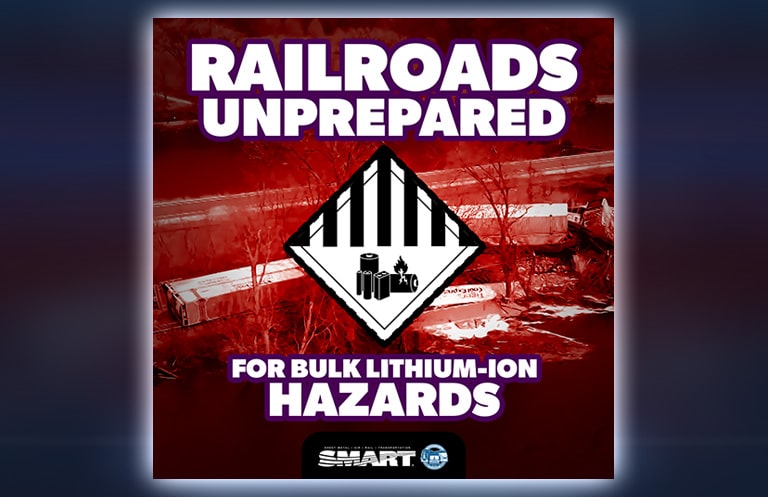
WASHINGTON, D.C. — Tesla Inc. has requested a permit to begin shipping lithium batteries by freight rail, and SMART-TD is having none of it.
Lithium can spontaneously combust if batteries have manufacturing defects, are punctured during an accident or overheat during shipping, potentially igniting and causing a fire or explosion.
“If these batteries need ‘white glove’ treatment to ship safely, they don’t belong on freight trains,” said Jared Cassity, SMART-TD’s Deputy Director of Safety and Legislative Affairs. “We aren’t going to sit quietly while our members are thrown under the train literally and legally. Railroad shipping isn’t bubble wrap and hand sanitizer. It’s heavy, dirty, and dangerous. That’s the truth.”
Representing over 100,000 transportation professionals across the country, SMART-TD is drawing a hard line in the sand: this proposal endangers rail workers, heaps new burdens on crews already stretched thin, and trusts the railroads to act responsibly, something every railroader knows is not likely to happen any time soon.
Bulk-shipping lithium-ion creates risks without safeguards
SMART-TD’s official comment indicates the shortcomings of the permit request:
- No real protection for the workers most exposed to danger.
- No limits on how much lithium can be shipped per train.
- No clear guidance on how rail crews should report derailments or incidents when lithium is involved.
- No defined responsibility for training or enforcing compliance.
Read SMART-TD’s full response ►
Rail crews face blame for problems out of their control
The proposed permit would shift accountability for expired documents, improper packaging, and vague reporting standards onto railroaders, who don’t handle the loading or creation of the paperwork for hazmat materials.
The fear is real: a train derails or shifts unexpectedly, and the crew could be blamed for a packaging failure they never touched. With lithium ion, that “failure” could result in an exploding freight car and a hazmat fire that cannot be extinguished.
“Rail workers should not be the ones left holding the bag when something goes wrong,” Cassity emphasized. “We’ve seen this pattern over and over: mistakes at the top get pinned on the people on the ground.”
Railroads historically neglect crucial training
The permit broadly refers to training “hazmat employees” but fails to answer several critical questions: What training is needed? Who provides that training? How is it enforced?
The industry has a troubling history, including hazardous materials training curriculum that has been rejected multiple times by the Federal Railroad Administration (FRA) but is still being used.
Norfolk Southern gave new hires just four hours of hazmat instruction in 2022. That is obviously not enough to cover the basics, let alone prepare workers for high-risk scenarios involving lithium batteries.
DeSoto, Wisconsin derailment is a wake-up call
BNSF derailed a shipment of lithium-ion batteries in DeSoto, Wisconsin, in 2023.
Overturned freight cars spilled into the Mississippi River. Train crews received conflicting instructions, with BNSF directing them to physically inspect damaged cars while local fire and hazmat responders warned of electrocution and fire risks from the submerged cargo.
Clearly defined, federally mandated training and emergency protocols are a necessity.
“You can’t just hope your workers ‘figure it out’ when lithium batteries are on fire in the water,” said Cassity. “We need rules. We need real training. And we need a plan before disaster strikes, not after.”
The Bottom Line: Our Members Come First
SMART-TD isn’t against progress, but advances should not come at the cost of worker safety, job complexity, and legal exposure.
“This permit and this product with relaxed standards don’t belong anywhere near a rail yard,” Cassity concluded. “We’re speaking up because no one else will. And we’re not backing down.”
Related News
- SMART officers boost advocacy with redesigned New Representatives II class
- Operation Lifesaver campaigns to promote rail safety in 11 states
- New TD Crew Room Flyers Available
- Colorado bill criminalizing transit assault one step closer to becoming law
- Honoring the Legacy of Brother John A. Saunders
- Kansas funds passenger rail expansion
- SMART’s General President Defends Our Brother
- Maryland Passes Monumental Transit Safety Bill
- Brother Wirth Crowned Champion in 168-Pound Masters Division Victory
- Chairman Pauli Announces Retirement, SMART-TD celebrates his career